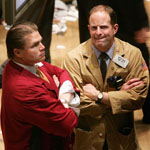
Renowned investor Jim Rogers (pictured left) says that the rally in stocks and the dollar will soon end, thanks to the Federal Reserve's massive easing policy. "I'm not buying shares anywhere," he tells Bloomberg TV. "I'm not selling short yet. But…if it keeps going like this, I'll have to start selling short eventually. I don't see the stock market as a great place to be in the next two to three years, maybe even the next decade." As for the dollar, "we're going to have a currency crisis probably this fall or the fall of 2010," Rogers says. "It's been building up for a long time. We've had a huge rally in the dollar, an artificial rally. … The U.S. dollar is a very flawed currency." Bonds also are overvalued, he says. And where does Rogers see investment opportunities? Commodities, as he has argued for months. "The only place I know where the fundamentals are getting better is raw materials," he explains. "We're going to have serious food shortages. … Prices are going to go through the roof." Whether the economy rebounds or not, "commodities are going to lead it," Rogers says.
Dominant Social Theme: All falling apart?
Free-Market Analysis: We've noticed how Jim Rogers seems to have raised his profile recently, and the only reason we can come up with is that he wants the world to notice what he's investing in. But in providing so much information, he is also muddying the free-market message and leading investors to conclusions about which they might wish to be skeptical.
Rogers is an interesting fellow. We've already pointed out in a previous article that we think he is the source for some of the anti-dollar/global currency stories that have ended up in the Daily Telegraph, causing so much of a stir, especially prior to the G20 meeting. We know Rogers is pro-Asian because he has settled in Singapore and believes the West is in decline. We believe he might be short the dollar and the stories and his general viewpoint about the West maybe converge. His Western bashing, in other words, may dovetail with his short positions.
We also know that Rogers understands free-market business cycle investing very well because he achieved much of his financial security and wealth as George Soros' trading partner and Soros knows as much about trading as anyone. Rogers has admitted to being greatly influenced by Austrian economics and of course Soros runs his trading strategies based on free-market business cycle principals – though unlike Rogers, Soros is somewhat devious about it and pretends to be a socialist.
What strikes as odd about Rogers' current stance is that despite all his sophistication, he may be trying to make so many plays at once that he is in danger of outsmarting himself. We think high-profile, hard-money broker Peter Schiff did this in the recent past by advocating the purchase of certain kinds of non US stocks when he could just have stuck to variants of gold and silver and continued to do very well.
Rogers seems to like complexity. He has to buy farm-land, he has to buy commodities, he has to be short the dollar and long goodness knows what else. We think it is much simpler than that. The business cycle has two legs: paper money and hard money. We're traveling up the hard-money leg currently and gold and silver will remain good investments until twelve-o-clock strikes. And that is still in our estimation several years away. Maybe many.
Also, as Rogers knows very well, gold and silver are not commodities, for investment purposes, and neither necessarily is copper or farmland. When it comes to commodities and land, Rogers is reaching for secondary, even tertiary investments. Sure, when a paper money economy hits a bad patch a lot can go wrong. But he might just as well start buying real estate in Manhattan on the cheap as farmland in Brazil if he wants to make plays away from the heart of the hard-money cycle.
Gold and silver in an honest money bull market do not function as commodities. They are money metals and may diverge from a commodity trend. Gold and silver can go up during a hard-money business cycle even as commodities move down based on a lack of economic activity. Speculators may certainly prefer to buy gold and silver than, say, wheat if they come to expect renewed inflation. Gold and silver are therefore repositories of value in the way commodities are not. What doesn't Rogers understand about this?
Maybe he IS buying commodities as an inflation play (we guess) but he is on record already as saying that he lost money fairly recently in commodities. We wonder why he is throwing so many different kinds of investments out there, publicly, and why he is offering up comments that seem to us, anyway, to muddy the waters for poor investors who are confused enough by all that is going on.

Rogers is a bit of an odd duck. We're not quite sure what to make of him. His historical partner Soros remains a great currency trader, no matter what you might think of his politics. Rogers is a wealthy and successful trader too. But we are not so brilliant as he is. We like to keep things simple. During this kind of exaggerated and powerful business cycle, history seems to show that you can't go wrong with honest money. For those who don't have world-spanning ambitions, gold and silver in physical and securitized forms remain powerful investments.
